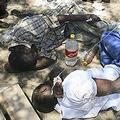 11月14日星期五,當辛巴威衛生官員在貝特布里奇(Beitbridge)首度向無國界醫生組織(MSF)提出報告時,僅有5件瘧疾感染案例。兩天後病例增至500件,到了週末,鄰近地區已有超過1500人受到感染。
11月14日星期五,當辛巴威衛生官員在貝特布里奇(Beitbridge)首度向無國界醫生組織(MSF)提出報告時,僅有5件瘧疾感染案例。兩天後病例增至500件,到了週末,鄰近地區已有超過1500人受到感染。
由於無法取得乾淨的飲用水與醫療資源,因而爆發大規模的霍亂疫情,使得上千名辛巴威百姓受到威脅。世界衛生組織(WHO) 12月10日表示,資源與人力的不足是造成疫情爆發的主因。
世界衛生組織表示,在辛巴威的62行政區中,從8月份開始,截至12月9日止已有超過2/3的地區傳出16,141件疑似霍亂感染的案例,造成775人死亡。
世界衛生組織駐辛巴威代表,曼德雷博士(Custodia Mandhlte)表示:「疫情能夠受到控制,但這必須仰賴諸多因素,尤其醫療從業人員之間應相互合作,以確保我方將資源投注在最需要幫助的地區。這些協助包括預防感染、快速的病例檢測與控制、治療方法的改良。」
霍亂是經由受汙染水源與食物傳播的急性細菌感染。世界衛生組織表示霍亂與缺乏管理的環境之間有緊密的連結,安全水源與公共衛生設施的缺乏或不足,是造成該疾病擴散的主要因素。
世界衛生組織正在建立霍亂管制指揮中心,結合辛巴威的衛生部門、兒童福利事業(Child Welfare)與其它醫療團體,希望面對這些衛生議題時能夠做出一致的決策。世界衛生團體也正為600萬美元的提案尋求資助,以推動其霍亂應變計畫。
布迪里羅(Budiriro)位於辛巴威首都哈拉雷(Harare)的西郊,人口高度集中,有接近半數的霍亂疫情在當地傳出。其他案例主要集中在南非共和國邊境的貝特布里奇(Beitbridge)與莫三比克邊境的穆奇(Mudzi)。
無國界醫生組織表示:「貝特布里奇鎮是由移民、卡車司機、性工作者、孤兒和鋌而走險的人所組成,大多數都試著跨越邊界進入南非。在辛巴威當前的政治局勢與經濟危機影響之下,基礎設施相當缺乏,尤其是人口成長如此不受控制的城鎮。那裡到處都是垃圾,開放型的水溝流經貝特布里奇鎮大多數的街道。在當地幾乎每天都缺水缺電。」
根據辛巴威醫療群(Zimbabwe Health Cluster)預估,這場霍亂可能會有超過6萬件病例。該團體與世界衛生組織協調合作,其中也包括醫療從業人員、非政府組織、衛生部門與兒童福利事業。
預估感染人數是根據目前辛巴威1200萬的人口有一半的人有罹患霍亂的危險,再推估危險群中約有百分之一的人會真正感染該疾病。
世界衛生組織警告,隨著雨季的來臨與越來越多人選擇在耶誕假期間出國旅行,假如不採取強硬的措施,霍亂可能會有進一步擴散的風險。
霍亂發生的主因為乾淨飲用水供應不足和對衛生設備的低落。醫療機構缺乏藥物、設備與工作人員也令疫情更加棘手。
為了治療感染霍亂所造成的脫水現象,世界衛生組織呼籲加強取得口服體液補充鹽類(oral rehydration salts)的管道。衛生官員表示體液補充鹽能夠迅速緩和身體不適與死亡的情形。
無國界醫生組織表示這是長期的問題。在貝特布里奇鎮,「汲水站並沒有修復幫浦的零件,就算有,幫浦也需要電力將水從水塔分配到城鎮。發電所需的燃煤已經超過一年沒有付款,煤炭也因此停止供應;當地同時也缺乏垃圾車所需的燃油;更沒有錢去支付垃圾回收人員的薪水。沒有裝備或供貨來改善汙水系統,也沒有錢付給工人進行施工。這些問題不是短期能解決的。」
On Friday, November 14, when the Zimbabwean health authorities in Beitbridge first reported cholera to MSF, there were five cases. Two days later, there were more than 500, and by week's end, over 1,500 people in the suburb were sick.
A widespread cholera outbreak, worsened by poor access to safe drinking water and hygiene, is threatening the well being of thousands of Zimbabweans. Contributing to the crisis is an under-resourced and under-staffed health system, the World Health Organization said today.
As of Tuesday, WHO says 775 people have died out of the 16,141 suspected cases of cholera that have been recorded since August in two-thirds of the country's 62 districts.
"This outbreak can be contained, but it will depend on many factors, in particular a coordinated approach between all health providers to make sure we are providing the right interventions where they are needed most," said Dr. Custodia Mandhlate, WHO Representative to Zimbabwe. "Such interventions include prevention, quick case detection and control, and improved treatment."
Cholera is an acute bacterial infection transmitted through contaminated water and food. WHO says it is closely linked to inadequate environmental management. The absence or shortage of safe water and sufficient sanitation combined with a generally poor environmental status are the main causes of spread of the disease.
WHO is establishing a cholera control and command center, in conjunction with the Zimbabwe Ministry of Health and Child Welfare and other health partners, to respond in a coordinated way to these health problems.
The world health body is seeking donor support for a US$6 million proposal for its cholera response plan.
About half of cholera cases have been recorded in Budiriro, a heavily populated suburb on the western outskirts of the capital, Harare.
Other major concentrations of cholera cases are in Beitbridge, on the South African border, and in Mudzi, on the border with Mozambique.
"The town of Beitbridge is a shifting tide of migrants, truckers, sex workers, unaccompanied children and desperate people trying to find a better life � mostly by attempting to cross the border into South Africa," says MSF. "With the current political and economic crisis in Zimbabwe, basic services are lacking, especially in a town with such uncontrolled growth. There is rubbish everywhere. Open sewage runs through most of Beitbridges' streets. Almost every day, there are cuts to water and electricity."
The outbreak could surpass 60,000 cases, according to an estimate by the Zimbabwe Health Cluster, a group coordinated by WHO that includes health providers, nongovernmental organizations and the Ministry of Health and Child Welfare
The estimate is based on the fact that half of Zimbabwe's 12 million population are potentially being at risk of contracting cholera, with an estimated one percent of those at risk of actually suffering from the disease.
With the rainy season starting and more people traveling due to the Christmas season, there are risks for further spread of cholera if strong measures are not taken, WHO warns
The major cause of the cholera outbreak is the inadequate supply of clean drinking water and poor levels of hygiene. Shortages of medicines, equipment and staff at health facilities throughout the country are compounding the health challenges.
WHO is advocating for improved access to oral rehydration salts for treating moderate dehydration, which is a symptom of cholera. Health officials say the rehydration salts could help quickly reduce sickness and deaths
MSF says the problems are long-term. In Beitbridge, "the water station does not have the parts to properly repair its pumps. Even if it did, it depends on electricity to pump water from the tower to the city. Electricity depends on a coal mine that has not been paid in over a year and can no longer supply coal. There is no fuel to run the garbage trucks; there is no money to pay salaries for people to collect the garbage. There is no equipment, or supplies, to fix the sewage system, nor money to pay personnel to do it. There are no quick solutions."


